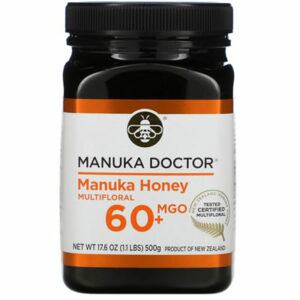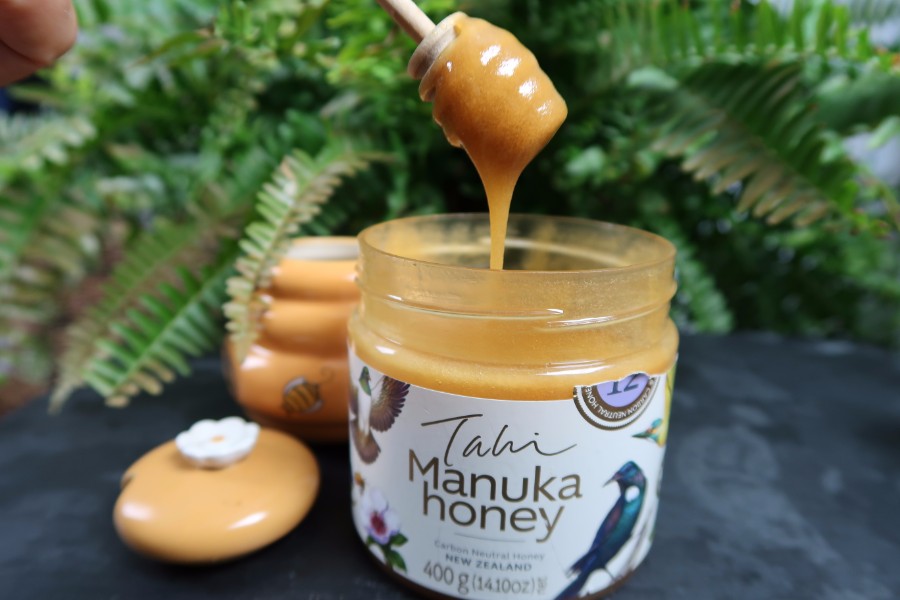Manuka Honey is single flower nectar derived from the Manuka tree. It is produced in New Zealand and eastern Australia.
Compared with other honey, Manuka honey contains a high amount of phenols, flavonoids, and pyruvaldehydes (MGO), plus the original high sugar content, low moisture, low pH and other characteristics, so it creates its excellent Antibacterial and antioxidant capacity.
Do you know manuka honey benefits and side effects?
Table of Contents
- How to choose manuka honey?
- What are the benefits of Manuka honey?
- Are there any side effects of Manuka honey?
- Where to buy Manuka honey recommended by most people?
How to choose manuka honey?
The scientific community has found that Manuka honey is different from ordinary honey in its “non-peroxide activity” non-peroxide activity (NPA), which has an excellent antibacterial effect, and the main molecule conferring this antibacterial activity is methylglyoxal (MGO) And dihydroxyacetone (DHA), the content is 100 times more than the average honey.
Manuka honey is very common in health food stores, but not every product has the same quality. It is better to have a label certification mark on the bottle body. There are currently a variety of rating standards, which are listed below.
UMF: UMF stands for Unique Manuka Factor. It is a standard established by the Active Manuka Honey Association of New Zealand. It mainly determines the content of MGO and DHA. The market value can be from UMF 5+ to UMF 30+. The higher the better the antibacterial activity.
MGO: MGO was developed by Professor Thomas Henle, an authority in the German food science community. It is the most intuitive rating method. It mainly measures the value of methylglyoxal (MGO). The score can be from MGO 30+ to MGO 800+. For example, MGO 550 +Represents more than 550mg of MGO per kilogram of honey, the higher the value, the better the antibacterial activity.
KFactor: KFactor is a standard created by Wedderspoon, a manuka honey manufacturer. It mainly measures honey purity, active enzymes, more than 250 compounds, DHA, pollen amount, pH, antioxidant levels, and phenolic compounds, but has not been determined. MGO and DHA antibacterial indicators, the value is divided into KFactor 12, KFactor 16, KFactor 22 from low to high, which means that the pollen content of Manuka can reach 65%, 75% to 90%.
BioActive: BioActive grading refers to the combined activity of peroxide and non-peroxide of honey, which are commonly Bio Active 10+, 15+, 20+, 24+.
What are the benefits of Manuka honey?
1. beneficial mucositis
Mucositis is mainly defined as ulcerative lesions or inflammations related to the oral cavity or gastrointestinal tract. The causative factors are related to infectious diseases, immunodeficiency, and drugs. Especially high-dose cancer treatments related to the treatment of head and neck cancer are most common (such as chemical or radiotherapy), the incidence rate is as high as 80%.
A randomized controlled study (12 weeks, 163 patients with lung cancer who received radiotherapy and chemotherapy) pointed out that the use of manuka honey (lozenges or liquids) did not have a significant effect of improving radiation esophagitis (pain) compared with supportive therapy, The use of painkillers, difficulty swallowing, nutritional status and quality of life have not been significantly improved.
Another randomized double-blind controlled study (6 weeks, 131 patients with head and neck cancer who received radiation therapy) found that compared with placebo (sugar), Manuka honey did not significantly improve oral mucositis caused by radiation therapy Effect (but can reduce bacterial infections).
*Conclusion: The use of Manuka honey has not been found to have a significant improvement effect on mucositis caused by radiochemotherapy, which needs to be confirmed by more studies
2. Improve sinusitis
Chronic sinusitis is a chronic inflammation that originates from the nasal and sinus mucosa. Common symptoms include purulent nasal discharge, nasal obstruction, facial pain, nasal polyps, and decreased taste. It is estimated that the prevalence of adults is about 12.5% to 15.5 %.
Treatment methods include drug treatment (antibiotic, nasal congestion reducer, topical or oral steroid, and saline irrigation) and nasal endoscopic surgery.
A randomized, single-blind controlled study (a 30-day study involving 42 patients with chronic sinusitis receiving oral antibiotics/steroids) pointed out that both saline irrigation and manuka honey irrigation can help improve symptoms, but the difference between the two Not obvious (measurement indicators include: culture-negative rate, endoscopy characteristics and quality of life).
However, the subset analysis also found that, for subjects who did not use antibiotics/steroids, Manuka honey washes were more effective in improving culture negativity than saline washes, which means that the use of manuka alone may have an acute attack. help.
*Conclusion: For patients with chronic sinusitis using systemic drug therapy, the use of Manuka honey rinse may help to improve the symptoms, but due to the small sample size, more research and verification are still needed.
3. Good for diabetic foot ulcers
A diabetic foot ulcer is one of the most serious complications of diabetes. The cause is related to neuropathy (the most common), peripheral arterial disease, and foot trauma. The prevalence rate is about 15%, about 80% can be cured, but 5% –24% require amputation due to severe infection.
A prospective, randomized, controlled, double-blind study (a 16-week study of 63 patients with grade 1 and grade 2 diabetes-associated lower extremity neuropathic ulcers indicated that the use of Manuka honey-impregnated dressings was more significant than traditional wound dressings. Promote wound healing and rapid sterilization effect.
*Conclusion: Manuka honey dipping dressing is an effective treatment for diabetic foot ulcers, but more research and verification are still needed.
4. Beneficial evaporative dry eye (meibomian gland dysfunction)
Xerophthalmia is a rapidly rising type of ophthalmological disease, which is mainly divided into dehydration type and hyperevaporation type dry eye. The former is mainly related to Sjogren’s syndrome and non-autoimmune lacrimal gland function, and the latter includes meibomian gland function Obstacles and external factors (such as contact lens wear or allergies).
About 80% of dry eye cases are caused by meibomian gland dysfunction, which is caused by eyelid inflammation, microbial proliferation, and lack of tear lipid layer.
A prospective randomized controlled study (11 weeks, 114 patients with meibomian gland dysfunction caused by dry eye) pointed out that Manuka honey products (brand name Optimel) combined with traditional dry eye treatment (hot compress, eyelid massage) And lubricant) can further improve the treatment results (especially to improve the eye surface staining, meibomian gland secretion quality, inflammatory cytokines, bacterial strain indicators are more significant).
*Conclusion: Manuka honey preparation may improve the effectiveness of traditional treatments for dry eye, but due to possible errors, it is still necessary to design accurate studies to further confirm.
Are there any side effects of Manuka honey?
For most people, it is safe to consume Manuka honey in moderation, but there are still some side effects to pay attention to, especially those who have been allergic to honey products may have dizziness, nausea, vomiting, weakness, sweating, irregular heartbeat, wheezing And other phenomena.
Safety Precautions
Babies under 1-year-old do not use because the immune system is not yet fully developed (honey may contain botulinum spores, which can easily cause botulism).
Do not use it for diabetics, it may cause an excessive rise in blood sugar.
Do not use in combination with epilepsy drugs or anticoagulants, which may affect the efficacy of the drug.
Where to buy Manuka honey recommended by most people?
In recent years, food safety problems in various countries have exploded, and it is not healthy but black-hearted products that everyone spends on. Therefore, European and American products with relatively strict quality control have become popular products.
And iHerb.com is a large-scale medical cosmetics e-commerce company in the United States. It has a high satisfaction rate of 97% in the evaluation of Google customers. It provides global home delivery so that you can buy it without risking buying fakes through purchasing high-quality health products.

